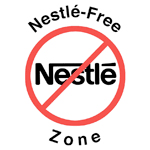cross-posted from: https://lemmy.world/post/14389267
Nestlé adds sugar to infant milk sold in poorer countries, report finds
Swiss food firm’s infant formula and cereal sold in global south ignore WHO anti-obesity guidelines for Europe, says Public Eye
Nestlé, the world’s largest consumer goods company, adds sugar and honey to infant milk and cereal products sold in many poorer countries, contrary to international guidelines aimed at preventing obesity and chronic diseases, a report has found.
Campaigners from Public Eye, a Swiss investigative organisation, sent samples of the Swiss multinational’s baby-food products sold in Asia, Africa and Latin America to a Belgian laboratory for testing.
The results, and examination of product packaging, revealed added sugar in the form of sucrose or honey in samples of Nido, a follow-up milk formula brand intended for use for infants aged one and above, and Cerelac, a cereal aimed at children aged between six months and two years.
In Nestlé’s main European markets, including the UK, there is no added sugar in formulas for young children. While some cereals aimed at older toddlers contain added sugar, there is none in products targeted at babies between six months and one year.



Addiction. If your baby won’t stop crying because they like the flavor of Nestle™ milk over everything else, then you’re goddamn right the parents are going to spend their money buying more to get their kid to shut up.
It already happened with morphine as a cough suppressant for infants.
And you hook hook them to a higher sugar level right from the beginning.
It’s really incredible how munch sugar we consume on a daily basis compared to just a few generations before. When my parents were kids “sweets” were mostly pastry. Thinks people had to bake or buy at the bakery. Not stuff from the supermarket (there weren’t even “supermarkets” around really) wrapped in plastic. Back then you had to go through a lot of effort to have something sweet that you could eat - you had to bake it yourself or go to the person who baked them. But even then things didn’t consist that much sugar. I’m even convinced that back then when people mostly bough local fruits on the market they weren’t that sugary as well. zthink about it: The sorts of fruits we consume today come mostly from specialized regions in the world that produce them. The specimen they grow have been heavily modified through genetic selection. It’s very much possible that if I ate an apple from a 100 years ago it wouldn’t be that sugary compared to these perfect looking versions we buy today.
Sugar is like a drug for a baby. When my little one was just born the doctors took a bloop sample. In order to sedate the child they put dipped their finger in a little sugar syrup and touched the top of the babies mouth with it. So sugar really is like a drug. And giving it to babies is a guaranteed money maker in the future.
Ah fuck i didn’t even think of that. That really pisses me off. Nestle is pure evil.